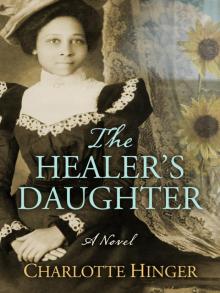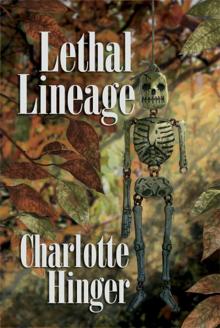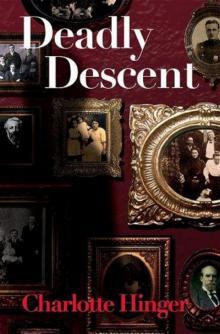- Home
- Charlotte Hinger
The Healer's Daughter Page 2
The Healer's Daughter Read online
Page 2
“Come to the home of John Brown. The home of avenging angels. Come to wide open spaces and skies so blue the angels are jealous that it can’t be matched in Heaven. But we talking about more than just land. We come to tell you about a town we’re setting aside just for you.”
There was a sharp collective intake of breath. Light flickered across whites of eyes yearning, yearning to believe.
“Yes.” The preacher lowered his voice to a soft drumming cadence. “Not just land, but a town. And that town’s name . . . and that town’s name . . . and that town’s name is Nicodemus.”
“Tell us ’bout Nicodemus,” the people chanted back. “Tell us ’bout this man.”
“Now Nicodemus was a slave.”
“Just like us, Lord,” a woman cried. She started to chant, sing out the wonder of the legendary African prince who was the first slave to buy his freedom.
“Yes. Nicodemus,” called the preacher. “A black man. One of our own who warned the white man he would suffer for chaining God’s children.”
“He suffer all right,” the woman shouted back. “Lord, he going to suffer.”
“Nicodemus said—” thundered the preacher.
“And Nicodemus said . . . Yes, Lord, yes, Lord. Amen and amen.”
“Telling ’bout a town.”
They echoed the preacher’s words. “Telling ’bout a town.”
“A town for the colored man.” The preacher paused after each phrase. “A town where you can make your own laws, lift up your own kind. All around, crops spring from the ground like they were blessed by God. Land . . . your land. Your own land.”
Your own land, Bethany thought cynically. Once again all it had taken was hearing the word “land” to jolt her from the hypnotic call to consciousness of the vulnerability of the people around her. Bitterness welled up from her stomach like rank sorrow. Sometimes she felt like vinegar and gall was all she’d been offered after the disastrous war.
She’d hated it when it started, hated it when the flaming blue-coated liberators burned the home she had always known, hated it when the lying Northerners came slinking around afterwards with their sharp Yankee teeth and shifty, greedy eyes.
She wanted to get up and leave, but she didn’t want to attract attention.
“Your own home . . . your own place. Come home, come home. Come to Kansas. The land of John Brown.”
Again, she shuddered and swayed, caught up in the rhythm, the call. It swept through her soul like a vibration from within.
The land, the free land.
“Your own home, your own place.”
She imagined herself in a little log cabin under blue, blue skies, gathering plants to heal her people, walking along gentle creeks. She would dye her dresses indigo. They would have babies in Kansas, same as here. She would still be called to deliver babies, to heal the sick.
Against her will, the cabin came to life in her mind. There was a huge fireplace, with a pot of good stew hung from a tripod. There were quilts made by her own hands, for herself, herself, her own free self. The patterns and colors formed a backdrop for the walls.
Her status would be the same. She was revered and feared here for the knowledge passed down from her mother and grandmother. She cultivated this fear. Fed on this fear. Her mother had led the way.
A woman’s ecstatic cry, “Yes, Lord, yes, Lord,” jolted Bethany. Warily, she opened her eyes and looked at the wailing black woman, work-worn and high hipped, her hands clasped above her head, strung out like an old pullet ready for the chopping block.
Bethany wanted to leave. She was not up to an evening of people being caught up in the Spirit. Still unnerved by Miss Nancy, she could not stand another night of wild emotion. She shook her head and scolded herself back into grim reality. She looked about at the yearning faces.
They believe, she thought with wonder. My people always believe. It’s a curse, this stupid happy ability to believe. If the white man had been standing at the pulpit instead of sitting down, maybe they would not believe. But a black man was issuing these promises.
She no longer believed men of any stripe or color. Too many blacks had turned out to be simple dupes and white men evil manipulators. She believed in herself—and God sometimes—when she was having a good day. She used to believe in Him a lot, before the foundation of the world shifted.
She had also once believed in the St. James family. Now she knew the white people who had owned the plantation she had always lived on were the sorriest excuse for humanity she ever come across. She had been far happier as a slave than she was now, trying to care for Nancy St. James. Sometimes she scolded herself for being so judgmental of these people who had lost everything they owned. But she felt betrayed. These were the same white people who had lectured about courage, who thought they were heroic people, bonded to lofty ideals.
They thought they were entitled to their grand lands, their fine houses, and their exquisite possessions. Entitled because they were white. Entitled because they were English. Certainly entitled because they possessed superior virtue. Well, the Yankee hordes had changed all that. The young mister St. James had fallen at Gettysburg. The elder St. James had died of grief and Miss Nancy might as well have.
At first, after they settled into their little house, Miss Nancy kept up the pretense of providing for herself by gallantly taking in sewing. In truth, Bethany provided for all their financial needs by doctoring white folks. Mostly ex-aristocrats who could no longer afford their European-trained doctors.
Bethany had never married, never taken a lover. Grannies often stayed single. Before the war, she had been too young to attract the attention of lusty young white men, and afterwards, her calling kept young blacks at a distance. Now, trying to slither around Miss Nancy’s profound depression was wearing her to a frazzle. She had neither the time nor the desire for courtship.
She willed herself to shut out the preacher and let her mind drift back to happier days when both she and Miss Nancy were free. Not trapped like they were now.
Miss Nancy St. James had been a dazzling beauty. Superbly confident of her place in the world, the natural order of things as willed by God, she cared deeply for the Children of Ham. Her slaves had not wanted for food, or clothing. They were never beaten unless it was absolutely necessary.
The St. Jameses immediately culled out sadistic and stupid overseers. They encouraged family bonds and were not likely to sell or trade away men who had “jumped the broom” with a St. James female.
Grief for the woman Miss Nancy used to be swept over Bethany like a wave. Her throat tightened, remembering how the Herbert women had kept the plantation going in ways other than medicine.
Her great-grandmother, Tillie, had been in charge of the vast domestic production needed to feed and clothe all the white and black persons living on the plantation. She organized the spinning, the weaving, and the final working of thousands of yards of cloth. Overseeing food production was her Aunt Faith’s job. When Bethany’s mother, Queen Bess, received her call from God to take Eugenie’s place as a granny, it was swift and terrible and accompanied by an awesome ability both to diagnose and to heal.
The preacher pounded on the pulpit, and Bethany started. His voice blasted. She closed her eyes, then opened them and looked around her with sorrow. It was not just the white people who had suffered great loss from the war. Some days, she would even give up her precious freedom to have the old life back.
Miss Nancy veered about like a blind mule. Sometimes cheerful and determined, then given to fits of weeping. The vibrant white flower of Southern womanhood had faded before Bethany’s eyes like clothing hung too close to a window. She had faded in spots and pieces, her mind a collage of suspicion and tatters. Bethany could live with that. What she could not abide was Miss Nancy peering at her over her handwork, her eyes filled with hate, as though Bethany could no longer be trusted.
The service ended. Bethany didn’t like either of the two men at the pulpit. She hoped the persons there
that night would not be duped. She re-tied her bonnet strings and prepared to plunge into the cold night air. Greeting people as she walked down the aisle, she moved quickly, hoping to avoid any discussion of going to Kansas.
She was nearly to the door when she felt someone watching her. She raised her eyes, swept the room with her gaze, and saw a small, grizzled mulatto man shamelessly staring at her. Her eyes did not waver, but she didn’t smile.
He wore a tattered hat and a gray frock coat. His wrinkled homespun pants were too long, but his vest fit well. He might have needed a haircut; she couldn’t tell. On the other hand, he might have preferred the bushy length. Might have thought the long, gray locks looked just right with his short, grizzled beard.
He looked ancient, or ageless. His face had heavy wrinkles and stains like an old burlap sack. His eyelids drooped over his amber eyes. His nose was distinctly African, but his skin had a yellow cast, like a drying tobacco leaf.
He removed his hat and came toward her. Surprised by his boldness, she waited.
“Ma’am.”
That was all. He did not blink. He was pine tree straight, but self-conscious like he had just won the right to hold himself so pridefully and would never bend his head or bow his back again for anyone.
Flabbergasted, she could only look at him. Then, bewildered, she stiffened. “Sir, I don’t believe we have met.”
“No, ma’am,” he said solemnly, “we have not. However, I have asked for one of your abilities and have been informed that Miss Bethany Herbert is the finest granny in these parts. I came with these men who occupied the pulpit tonight.”
“You’re with them?” she asked.
“Yes, ma’am, I am. My name is Theodore Sommers. And I am a townsman. I help folks get started.” Sommers clutched the lapels of his coat. He did not flinch from her unswerving gaze.
“A townsman?”
“Yes, ma’am. I come to help these folks start a town. I can help get land for folks, too, if that’s what they wants. But not all our people are just dying to farm,” he said. “Brings back memories. Bad ones.”
She laughed. “Yes, I expect it does.”
“Too many of our people ended up a different kind of slave after the war, chasing after land. Working ground, picking cotton all their lives didn’t do them a lick of good when it come to understanding how money works. Money is a white folks’ game.”
“And towns? Why would they do better at towns? We don’t have any background for that, either.”
“We know how to do things white folks don’t know how to do. Think about it. On big plantations, our blacksmiths used to be just blacksmiths. Our teamsters just teamsters. Our sawyers just sawyers. White folks out West veer around from job to job. Try to do it all themselves. I can promise you, we sure enough needed. White folks going be begging us to help them.”
“And where, pray tell, would we get the money for this venture?”
“From the town company. They going to sell us the lots on credit and loan us the money to get started.”
She stared at the people flocking around the black preacher and the energetic little white man. Her throat tightened with despair. For all of them. It was time for her to face the north wind, the cold street, and be done with this stranger. Put him in his place, if he had one. If any of them did now.
“You do our people no service, sir, with these promises. However, they will all undoubtedly follow like sheep. I, for one, will not.”
“Look at me, ma’am. Couldn’t anybody mistake the likes of me for a flim-flam man. Not likely, now is it?”
She laughed then. “No, I reckon not. Have you been to Kansas? This place where there will be no more prejudice, no more terror?”
“Not just been there, I live there.”
“You have your own home?”
“My own home. In a town called Wyandotte. It’s east of where we going, but I’m going to sell it and come live with y’all in the new town. Might file for land, too. It’s there for the taking. Yes, sir, a place in town and a place in the country.”
She had doubted the other two men, but there was something about this one. Perhaps it was his humility, the infinite patience in his kind, weary eyes.
“I’m not a farmer, sir. I’m a healing woman, but then you already know that.”
“Don’t matter. The land’s there for the taking. For you to use. Kansas law says you can claim one hundred sixty acres. You have to live on it, but it don’t say what else you have to do with it.”
She noticed a neatly darned spot in Sommers’s old gray coat. He had cleaned his aged, heavy brown shoes with care. A careful man speaking careful words didn’t always have careful ways, but Sommers clearly knew how to take pride in what he’d managed to grab hold of.
“There’s plenty of people here tonight who would die for such a chance, Mr. Sommers. But I’m not one of them.” She tugged on the strings of her bonnet.
The wee upright old man proved he could read her soul. “In Kansas, ain’t no one going to tell you what kind of hat you have to wear.”
She started. The women here tonight gloried in owning a hat, once an emblem of status in their native Africa. After the war, Bethany had chosen to wear bonnets, strictly forbidden headgear for slaves. Even though many other healers still wore the traditional white turban, she refused to do so.
“I would love to be truly free, sir. But I depended on white people before the war, and I do now. Most of the women who actually pay me money are white people. They trust me because my family has always been in this county doctoring and delivering babies. I can make a living. It’s a poor living, but we have survived.”
“We? You have children, then?”
“No,” she said. “I live with my white mistress, who lost everything in the war. I lost everything, too.”
He nodded. “And so now you taking care of her?”
“Yes. As best I can. She believes she’s still in charge.”
“And you help her keep up this act?”
“It’s getting harder and harder. Sometimes I think when she looks at me she sees the whole black race standing there. She thinks I started the war, burned her house, turned on her.”
“That’s why our people must leave. The same people that used to beat us ain’t gonna just love us now that the war’s over. What Northerners dreaming up don’t make sense. They think the white folks and the black folks are somehow just going start working together. Won’t happen. Not in this man’s lifetime.”
Bethany was impressed by his common sense. She missed it. Her people used to be full of it. This kind of intelligence was highly prized—motherwit—a type of intuitive thinking that had allowed her race to survive. Nowadays she could just swear every ounce of her people’s brains had drifted heavenward in the smoke of the burning plantations. There wasn’t enough sense left to outsmart a possum.
“Are there women in Kansas? Having babies?”
“Some, but not enough to keep a doctor busy.”
“And how would you have me live? Just breathe the fine air these men have been telling me about? Drink the pure, fine water? What would I do for food?”
“Don’t want you to just doctor for a living. I want you to start a school.”
“A school?” Her heart lurched. She felt the sudden rush of blood to her cheeks. “A school?”
“Yes, ma’am. A school. Our people need schools.”
“Don’t I know that, Mr. Sommers. Dear God, don’t I know that.”
She and Miss Nancy had been born nine months apart. She had never lived in the slave quarters. She had never asked her mother who her father was. She and Miss Nancy had discovered each other when they were about three years old. They had played together, laughed together, and when the tutor came to teach Miss Nancy, it had been understood that it was “just fine” with the St. Jameses if Bethany listened in. It wouldn’t hurt a thing.
The tutor, Mister Jeremiah Epstein, was a Jewish man with liberal ideas about scholarship for women. He saw
no reason to spare females rigorous instruction. One day he noticed Bethany paying rapt attention when he read Greek mythology aloud.
When he quizzed Bethany on the meaning of the story, he was at first amused, then stunned at the depths of her insights. He was careful to give glowing reports about Miss Nancy to her parents—but her companion! He could not resist stretching the mind of the remarkable Negro child.
Bethany looked at Theodore Sommers, her eyes filled with tears. Of all the advantages she had had, it was schooling she prized the most. She knew the difference it would make for others of her race.
“I want you to file on homestead land,” he said. “Even though we’re starting a town, I want us circled by land of our own. Then start a school. Our children need a school.”
“I could never, never leave Miss Nancy.”
“You can, and you must, Miss Herbert. It won’t never be the same again. The white folks that used to love some of us have thrown in with the white folks who’ve always hated most of us. The free blacks that always looked down on us are scared to death they will get mixed up in people’s minds with Negroes who have just been freed. Some folks that thought they wanted freedom wish they could go back to what they had before. Ain’t no one, nowhere, happy with the way this war turned out.”
“Do you trust these white folks, Mr. Sommers? The ones who are backing this town company?”
Time seemed to stop as he carefully considered this question. He twisted his shoe on the floor like he was squishing a bug. Then he lifted his head and looked her squarely in the eye.
“No, ma’am, I don’t suppose I will ever really trust a white man.”
“Then how can you possibly, possibly ask us to take this chance? Leave our people, our homes?”
“Because the folks that were plumb worn out thinking of ways to be mean to us colored folks done got a second wind. Time for us to go. Don’t trust them, but I trust us. The government wants people in that state. Wants them bad enough to give land away. Has to be some reason they wants us.”
“And what could that possibly be besides our strong backs and untaught minds willing to believe any lie they choose to tell?”

 The Healer's Daughter
The Healer's Daughter Hidden Heritage
Hidden Heritage Lethal Lineage
Lethal Lineage Deadly Descent
Deadly Descent Fractured Families
Fractured Families